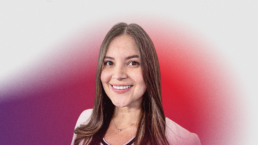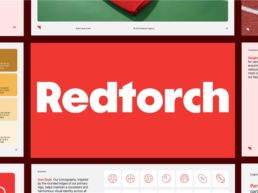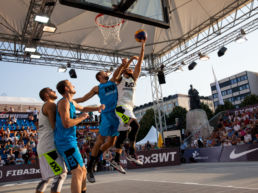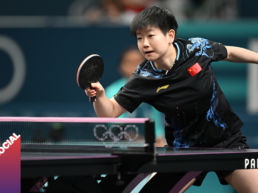From speed skating in her home country of Colombia aged 5 to working as a social media editor for one of the most-followed sports federations in the world – Union Cycliste Internationale (UCI) – Andrea Vásquez has had an impressive career in the industry. Her current role for UCI focuses on the promotion of cycling at every level.
I chatted with Andrea about her career, what she thinks the future of women’s sport looks like, and how more women and girls can be encouraged into the industry.
This interview forms part of an ongoing series for Redtorch’s She Moves The Game initiative (find out more here).
Could you tell me about your current role and describe the work you do for UCI?
As one of the social media editors in UCI’s Digital Transformation department, I help to promote cycling at all levels across all our digital channels. We present cycling not only as a professional sport, but as an easy-to-access activity that anyone can enjoy. As well as showcasing the elite side of the sport, we aim to reach as many different audiences as possible to promote cycling as a healthy, sustainable activity.
Can you share more about your career journey?
Yeah, so the journey started many years ago when I was little – maybe about five or six – doing speed skating (the kind with rollerblades!) which is huge in Colombia. I did that until I was 16 or 17 before I went to uni in Medellín. I come from a sporty family – my dad played football then took up cycling, and my brother was a professional cyclist in Colombia. So I’ve always been part of the sports industry in a way.
While I was at uni, the city hosted some major sporting events including the 2010 South American Games and a FIFA U-20 World Cup in 2011. I started volunteering at these events, because I loved sport and wanted to be involved, even though I wasn’t practising it professionally or anything. It was there that I met an incredible group of inspirational people who organised the events and showed me that if you have the passion and want to be in the industry, you can make it happen.
That’s when things really started to progress. I finished my degree and went into an internship for the Metro de Medellín. It was purely a corporate company, and while I enjoyed what I was doing, it didn’t feel quite the right thing. As I came to the end of my internship, I got a call from a contact I made whilst volunteering at events. It was such a coincidence! They said, ‘Hey, look, we have an Archery World Cup in Medellín next year and we’re looking for a journalist, someone who speaks English, likes sport and has experience in hosting events. Lots of people have recommended you, so it would be good to have a chat.’ I thought to myself … Archery… what am I going to do? I don’t know anything about it.
But then I thought, Why not? I know I want to work in sport. So I took the opportunity which in turn led to what is now my life.
At that World Cup event, I met up with members of the International Federation (World Archery) and they told me, ‘We like what you’ve been doing here – would you be willing to do communications at an event in Croatia?’ I took up the challenge – and spent nearly eight years working with that federation and other organisations as a contractor.
When I moved to Switzerland, I saw an opportunity to work with UCI. Cycling’s a sport I’ve always enjoyed and has been close to me and my family. It’s been over a year and a half since I began working here and it’s been both enjoyable and professionally challenging, which is great.
It’s brilliant that sport has always been a part of your life since you were very young. What have been the most significant milestones or achievements in your career so far?
It’s been quite a journey, and many things come to mind right now. One of the biggest was when Medellín bid for the 2018 Youth Olympic Games. I was supporting the city in that process and learning about the Olympic movement and how it worked. I was also working with the same group of people I’d previously met at the South American Games and the FIFA U-20 World Cup. I think that’s when everything clicked even more because it shaped a vision of the industry and where I could make an impact. Although Buenos Aires won the bid in the end, my goal was clear… as soon as I finished my internship, it was goodbye, corporate world!
A crazy moment was when I finished that corporate internship – my boss called and offered me a job. And I was like, What am I going to do? I remember everyone around me, my friends, my parents saying, “Oh, you’re going to take it. Of course, you’re going to take it.” But something didn’t feel right and I thought, Okay, I’m going to close my eyes and listen to my head, not to anyone else. So I decided to say no which proved the right call. Those kinds of things, when you really know, you must go for it.
What is the best part of working in cycling? Is there anything coming up that you’re excited about or an area of cycling that you’re most interested in?
This year, we had the biggest event [UCI World Championships in Glasgow] to work on – it was huge and kept us very busy. In cycling there’s no such a thing as off season, which you often have in other sports, because we have events all year round. Right now, for example, when it’s the quiet season for us, we have cyclo-cross events. I don’t know how the riders manage – they’re going to be competing on the 23, 26 and 30 December. And I’m like, it’s Christmas! Why would you do that?! So, anyway, there’s always something happening. You’re never bored at work, and that’s the cool part of it.
It’s also good that we don’t focus much on the differences between women and men. It’s more about the discipline and the sport itself, rather than about a division or anything similar.
And that’s okay, too, because our goal from the digital side of things is to inspire people to take up cycling, even if it’s only for getting to work.
Absolutely. Part of what we’re doing with She Moves The Game is promoting the idea that we should be celebrating and championing all athletes for their incredible abilities and performances.
How do you balance promoting women’s cycling with other cycling-related content and events on UCI’s social media channels?
We try not to focus on gender but on the discipline. We have dedicated channels for all our disciplines, but we never highlight the difference between men’s and women’s events. I mean, we do have the titles, of course – such as women’s champion/men’s champion – but our aim is to focus on the sport itself, showcasing the athletes and what they’re achieving, covering events and engaging the fans.
What do you think the main challenges are that women in sport currently face? And how successfully do you think the sports industry is tackling them?
I think that the world progresses faster and faster each year. Progress is never linear, and there are setbacks, but the rate of acceptance of equity as a core principle of humanity is ten times greater than ten years ago, which was ten times better than a decade before that.
Unfortunately, there will always be those people, even as an audience, who hold it back. But by knowing that we – as professional individuals – are positively contributing to a sport, and a wider sporting community, that treats equity as a fact, we are accelerating positive change. The more of us that are aware of that mentality, the better.
What strategies, campaigns or content do you think have been great in engaging the audience and increasing awareness of women’s events/disciplines?
Lately there have been some really good ones, especially the 2023 Women’s Football World Cup. One of my favourite campaigns was last year’s Serena Williams Nike advert because the message is so powerful: by changing nothing, she changed everything. It shows how she did it all by herself, battling through and coming out on top. The campaign did a fantastic job of depicting her as the person she is: athlete, mother, friend, daughter, everything.
The other really cool one was the Heineken campaign from last year’s UEFA Champions League called Fresher Football. Heineken created a website where they included all football achievements and statistics, no matter if it was from the men’s or women’s game. Lots of women were at the top of the charts. As the website is still active, you can still see stats based on achievement rather than gender.
That’s one of my favourite messages, and one I try to apply to everything I do.
What do you think the future of women’s sport content will look like in 10 years’ time?
Predicting social media trends or platforms these days is impossible. I hope that we’ll get to a stage where we don’t have conversations about whether men and women are equal, it will just be a given, across everything we do and through the language we use. I would love to see that.
What or who inspired you to get involved in a typically male-dominated industry?
I’d like to bring in an example of one of my female mentors in sport – Esperanza Palacio. She was one of the first female journalists in Colombia and Director of Comms at the events I mentioned earlier [South American Games and FIFA U-20 World Cup]. I was very lucky to meet her when my interest in sport was growing because she taught me so much. She was a sports journalist at a time when women were not considered able to cover sport. It was an almost entirely male-dominated industry at the time which make her stories all the more amazing. Everything she said about covering an event was incredible.
I always remember 1994 – before a FIFA World Cup in the US – when Esperanza was working for one of the most famous newspapers in Colombia. The Colombian football team was on a world tour; the newspaper wanted Esperanza to go with them and report back on what they were doing. She became only the second woman at the time to enter a stadium in Saudi Arabia; she reported that there weren’t any toilets for women!
She wrote fascinating stories right from the start but she felt she had to prove herself all the time otherwise she wouldn’t have been taken seriously; that she had to develop a huge character to prove herself over and over.
But that didn’t stop her. Meeting her and listening to all those stories shaped my vision in many ways, because I knew I wanted to be like her one day. I hope I can get there at some point. She’s one of those people in my life that anytime I need advice, I give her a call and she’ll be there. That’s awesome because it proves that when you’re willing to go for it, you can do it.
I think you’re totally right that role models and mentors play a vital role in getting more women into sport. What advice would you give to girls or women who want to kickstart or progress their career in the sports industry?
Simple. Just do it. Ignore any suggestion that being a woman can hold you back.
Because if you’re committed and know what you want to do and where you want to go, you can achieve it, and nothing is going to stop you. I mean, it’s more like proving who you are, where you want to go, and things will come. It might not be easy, but go for it. Don’t feel scared and don’t feel that you don’t deserve something just because someone tells you no.
We hope you agree that Andrea’s story and passion for sport is a testament to breaking barriers and paving the way for more women in the industry.
Keep an eye out on our website and LinkedIn as we continue to highlight extraordinary women in sport through She Moves The Game.
Redtorch is a global research, content & creative agency that makes sport more relevant to more people. Click here to find out more about our work.
Rozie Fuller
Hi, I’m Rosie. A football mad, crazy horse lady… a rare species! Spend most of my life on social media to keep up with the latest news and hottest trends.
My most memorable sporting moment is …
My first ever trip to Old Trafford to watch Manchester United play (despite the fact we lost).
I am happiest when …
Spending time outside with my horse… even in the rain!
The sports person that best represents me is …
John Whitaker – always calm and collected under pressure.
The three things at the top of my bucket list are …
1. Go on a horseback safari
2. Get a dog of my own
3. Watch England lift a major international football trophy
A quote I try to live my life by is …
“I don’t do stress… it gives you wrinkles” - Me





